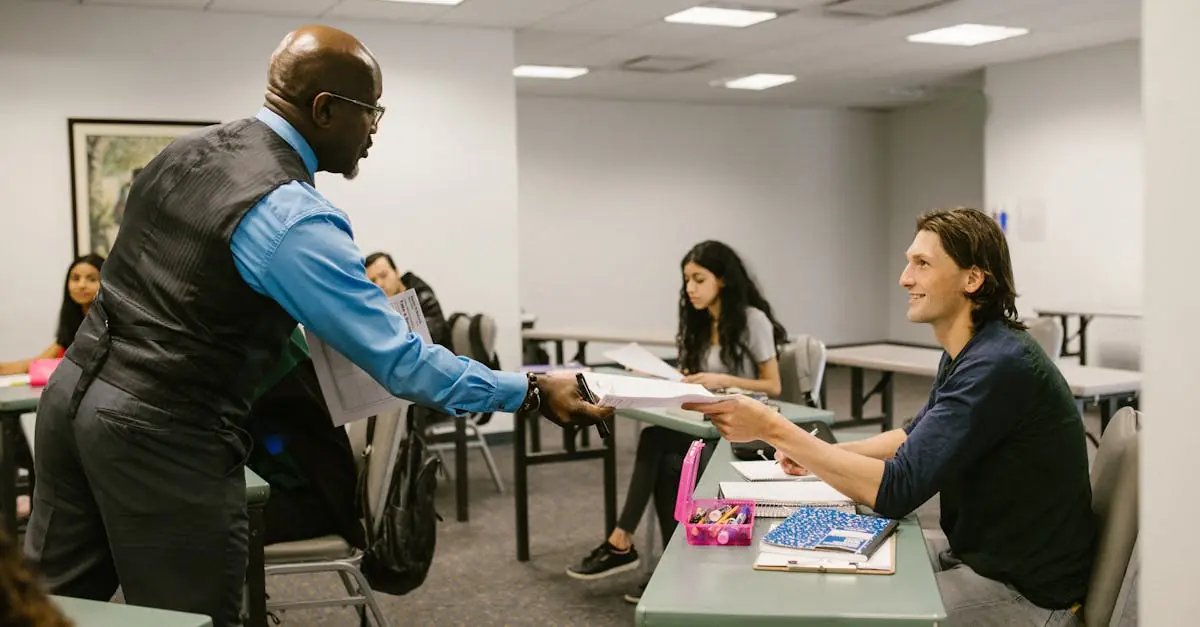Table of Contents
ToggleIn today’s fast-paced world, students face a mountain of information that can feel overwhelming. But fear not! With the right learning strategies, they can conquer that mountain and emerge victorious. Imagine turning study sessions into a game where they’re not just memorizing facts but actually mastering skills. Sounds like a dream, right?
These strategies aren’t just about hitting the books harder; they’re about working smarter. From harnessing the power of active learning to using technology as a trusty sidekick, students can transform their study habits and boost their academic performance. So grab a snack, settle in, and get ready to discover the secrets that can turn even the most chaotic study sessions into productive power hours. Who knew learning could be this much fun?
Importance Of Learning Strategies For Students
Effective learning strategies significantly impact students’ academic success. These strategies enhance comprehension and retention of information. By employing techniques such as summarization, questioning, and self-explanation, students strengthen their understanding of subject matter.
Active engagement during study sessions creates lasting connections with material. Techniques that foster critical thinking skills encourage deeper learning. Students who use varied methods, like flashcards and mind mapping, often retain information better than those relying solely on rote memorization.
Utilizing technology as a learning aid also accelerates mastery of concepts. Educational apps and platforms provide interactive experiences that make studying more dynamic. Students gain insights and immediate feedback, which facilitates improved learning outcomes.
Time management stands as another crucial aspect of learning strategies. Developing study schedules helps students allocate time effectively across subjects. Prioritizing tasks allows for increased focus and motivation, ultimately improving performance.
Collaboration among peers enhances understanding and creates a supportive learning environment. Group study sessions often lead to diverse perspectives and shared resources. Students gain clarity when discussing challenging topics with classmates.
Incorporating these strategies cultivates a positive attitude towards learning. Students begin to view studying as an opportunity for growth rather than a chore. Adopting these methods transforms chaotic studying into an organized and enjoyable experience, ensuring long-term academic success.
Types Of Learning Strategies
Understanding different learning strategies is vital for students aiming to enhance their academic performance. Key approaches include active learning, collaborative learning, and metacognitive strategies.
Active Learning Strategies
Active learning strategies focus on student engagement in the learning process. Techniques such as summarization, questioning, and self-explanation encourage students to interact with the material. Engaging with the information enhances comprehension and retention. Utilizing tools like flashcards allows for quick reviews and promotes active recall. Mind mapping helps visualize relationships between concepts, further reinforcing understanding. Involvement in hands-on activities or discussions cultivates critical thinking and makes learning more enjoyable.
Collaborative Learning Strategies
Collaborative learning strategies emphasize the value of peer interaction in the educational process. Group study sessions enable students to share diverse perspectives, enriching the overall learning experience. Working together on projects can enhance problem-solving skills and boost motivation. Peers bring different strengths and resources, facilitating a deeper understanding of challenging topics. Educational platforms that foster collaboration can further enhance this experience through shared resources. Building connections among classmates often results in lasting benefits and fosters a supportive academic environment.
Metacognitive Strategies
Metacognitive strategies involve self-awareness and self-regulation in learning. Students benefit from reflecting on their thinking processes and understanding their learning preferences. Setting specific goals and monitoring progress allows for targeted adjustments in study habits. Techniques such as self-questioning promote internal dialogues that enhance understanding. Students can improve their study strategies by assessing what works and what doesn’t. This awareness empowers learners to take control of their educational journey, leading to greater academic success.
Implementing Learning Strategies
Effective implementation of learning strategies can enhance students’ academic performance. Two crucial elements include setting clear goals and creating an organized study schedule.
Setting Goals
Students should set specific, measurable, achievable, relevant, and time-bound (SMART) goals. This approach ensures clarity and focus, providing motivation for students as they work toward their objectives. For instance, instead of stating a vague goal like “study more,” students can specify, “review math concepts for 30 minutes daily before tests.” Such precision helps track progress and adjust efforts as needed. Regularly reassessing their goals keeps students accountable and engaged in their learning journey.
Creating a Study Schedule
Creating a study schedule can significantly improve academic outcomes. A well-structured plan allocates time effectively and prioritizes essential tasks, reducing feelings of overwhelm. Students should plot specific blocks for subjects, ensuring consistent review sessions. For example, scheduling chemistry reviews on Mondays and Wednesdays establishes a routine that promotes retention. Incorporating breaks within study periods fosters sustained focus and mental clarity, allowing students to maintain an optimal level of engagement. Regularly updating the schedule in response to changing priorities ensures adaptability and continued effectiveness in their study habits.
Evaluating Effectiveness Of Learning Strategies
Evaluating learning strategies ensures they effectively enhance student performance and comprehension. Key indicators for effectiveness include improved retention of information, increased engagement during study sessions, and positive feedback from students regarding their understanding of the material.
Observation plays a crucial role in evaluating effectiveness. Teachers often observe student participation and enthusiasm during learning activities. Increased participation typically signifies that a strategy resonates well with students. Surveys and feedback forms gather student insights on which strategies they find most beneficial.
Data collection also helps assess learning outcomes quantitatively. Standardized tests or quizzes administered before and after implementing a learning strategy provide concrete evidence of improvement. Additionally, tracking grades over time reveals trends in academic performance, indicating possible correlations with particular strategies.
Peer collaboration often enhances the effectiveness of learning approaches. Group discussions and study sessions provide insight into diverse perspectives, allowing students to engage with the material actively. Evaluating collaborative efforts involves assessing group dynamics, effectiveness in teamwork, and the depth of understanding demonstrated during presentations or discussions.
Self-reflection promotes metacognitive awareness among students. Students reflecting on their study habits can identify strategies that yield the best results. Journals or self-assessment tools facilitate this process by helping students track progress and adapt their approaches as needed.
Regularly revisiting and revising learning strategies further maximizes effectiveness. Adjustments based on evaluations ensure that techniques stay relevant and beneficial. Flexibility in learning approaches leads to sustained academic success, transforming study sessions into productive and enjoyable experiences for students.
Adopting effective learning strategies can truly transform a student’s academic journey. By focusing on active engagement and collaboration, students can enhance their understanding and retention of information. Utilizing technology and structured study schedules further supports their efforts in managing time and reducing overwhelm.
Encouraging self-reflection and regular evaluation of these strategies ensures they remain effective and aligned with personal learning goals. As students embrace these techniques, they not only improve their academic performance but also cultivate a positive attitude toward learning. This shift can lead to a more enjoyable and productive study experience, setting the stage for long-term success.




